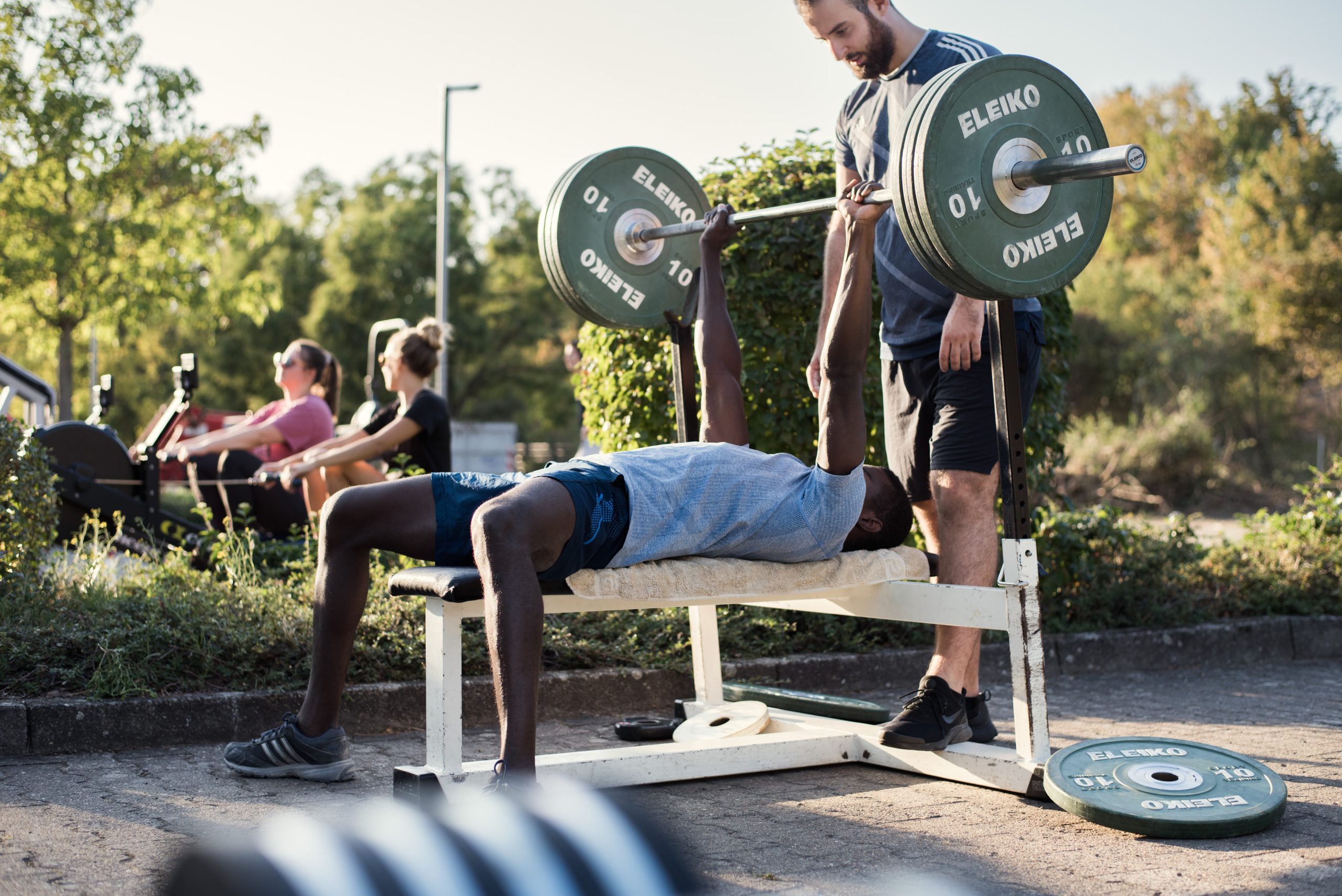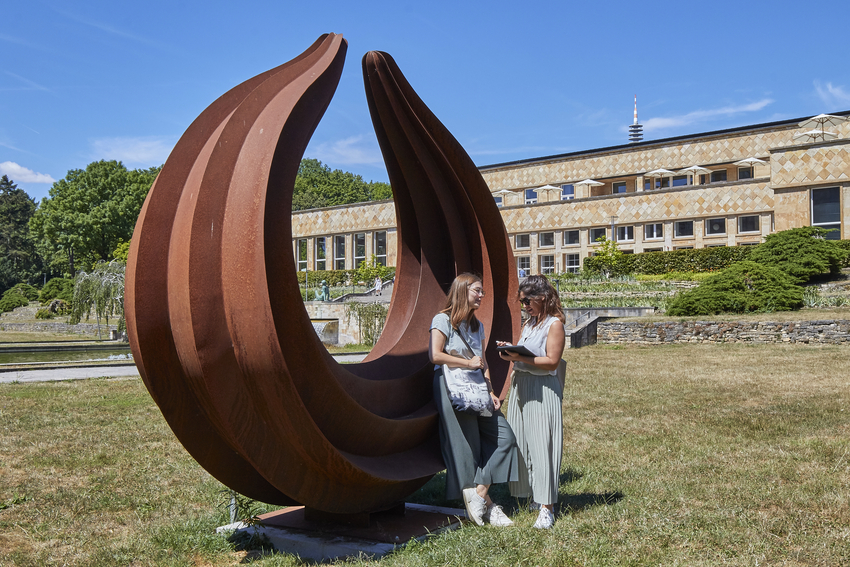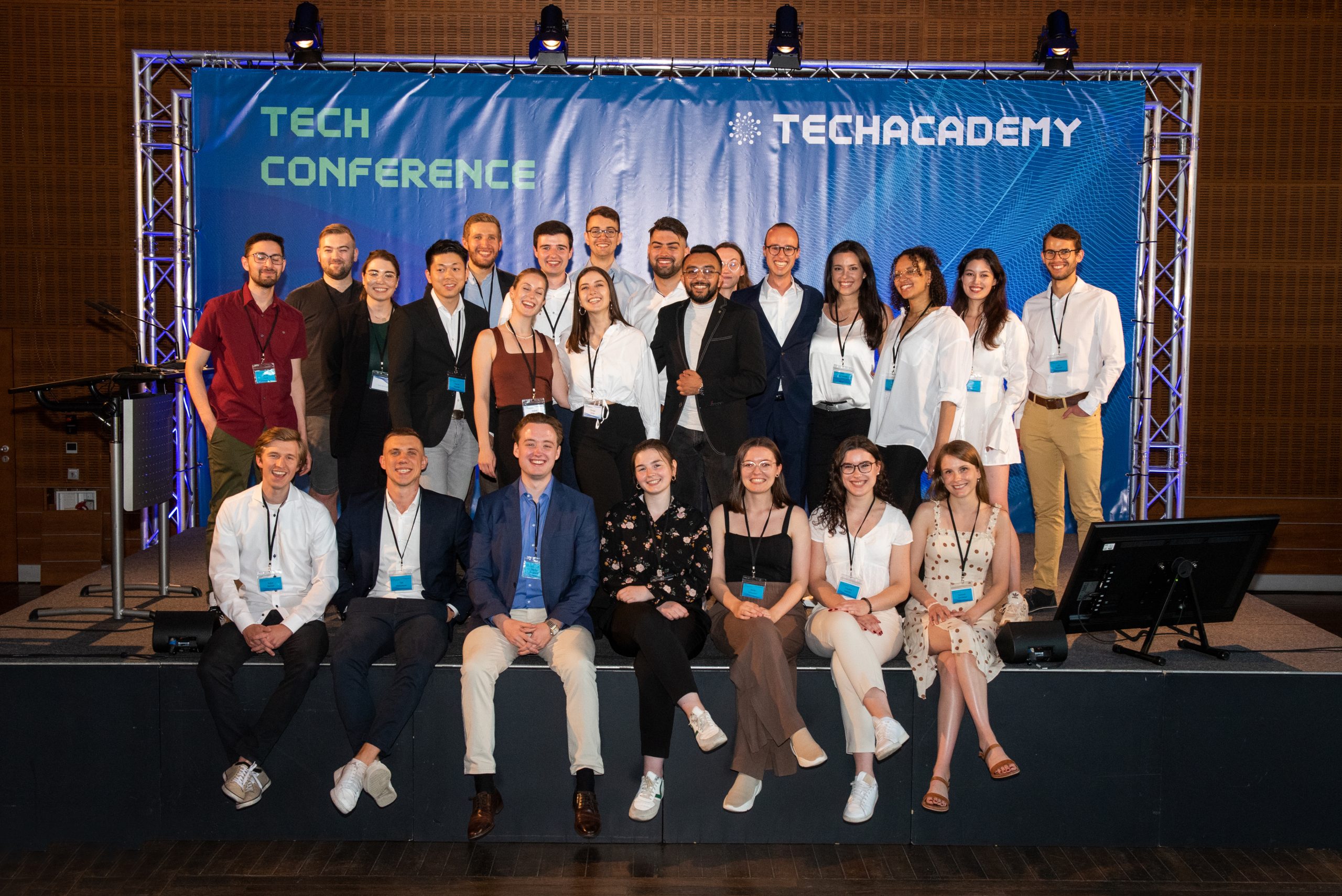To teach digital knowledge free of charge, professionally and in a team-oriented way for all students at Goethe University Frankfurt – this was the founding principle of the student initiative “TechAcademy”. What did it require? A really good idea – and above all, a really good team.
TechAcademy’s “really good idea” could be described as a great mix of programming courses, social commitment, inspired group dynamics and social responsibility. Each semester, TechAcademy offers 100 students at Goethe University Frankfurt an intensive digital studies programme. The aim is to help students studying subjects not related to computer science overcome their fear of programming. And to integrate and empower women at an early stage in a field traditionally dominated by men.
Over 450 students from 14 faculties and 60 degree programmes have attended the programming course since 2019. The remedy that TechAcademy applies to combat frustration and loss of motivation among students is “community”. Participants spend half their time on eLearning courses, during the other half they are closely guided by the TechAcademy team in small groups at “Coding Meetups”. Team spirit is great: more and more former participants are joining the 30-strong TechAcademy team which now also organises an annual high-profile TechConference.
In 2021, the TechAcademy team was rewarded for their ideas and acknowledged as “Students of the Year” by the German Association of University Professors and Lecturers and the German National Association for Student Affairs.
A great mix of programming courses and social commitment
The Goethe Corona Fund
A "special" fundraising campaign
The idea of the Goethe Corona Fund was developed by the university’s External Funding Department in the very first days of the pandemic. The aim was to help researchers unbureaucratically and without delay to make their contribution to overcoming the coronavirus pandemic. The ambitious goal was a fundraising target of €5 million. Barely ten months after the first appeal by Goethe University Frankfurt and University Hospital Frankfurt, the day had come: more than 2,000 private individuals, foundations and companies had helped to reach the goal. The largest donation was over €1 million, the smallest, a donation from a PAYBACK card, was 2 cents.
The non-profit online donation platform betterplace.org, which the university used for the first time, did not only reach Frankfurt citizens and regional foundations and companies. The appeal spread far beyond the Rhine-Main region – donations arrived from Hamburg and Munich as well as the USA. By the end of 2021, the fundraising target had been far exceeded: two endowed professorships and project funding with a volume of €7.2 million are made possible via the Goethe Corona Fund.
Over 40 research projects were funded – virology equipment, for example, and safety training for nursing staff in contact with highly infectious patients; a large number of medical and scientific projects on SARS-CoV-2 were supported, for instance on understanding the virus and treating COVID-19. Research was conducted on the functioning of air purifiers in schools and on the work situation of nursing staff and doctors. Projects exploring the pandemic´s social impact on families, education, and care services were also funded.
In a media report, a fundraising expert described the successful initiative by Goethe University Frankfurt and University Hospital Frankfurt as “something special”. A special, unique fundraising campaign – that’s how all the stakeholders felt. And that it is an initiative to build on.
Technical support and agony aunt: The Media Technology Department
"We've been up all night for you. Please tell us that... 72%... it runs without stuttering, 16%... it's still a bit jerky, 12%... nothing works at all*):" The nightly tweets from 2020 and 2021 speak volumes - since the Corona pandemic, nothing has been the same in Goethe University's media technology. A mood picture from the machine room of the university computer center.
In February 2020, we were all sitting in our office and one of us reads “600 new cases of coronavirus” on the web. “Will these numbers increase?” Soon afterwards, the wave broke over us, and suddenly the Media Technology Department was one of the most sought-after services at Goethe University Frankfurt. Compared to other universities we were already quite well-equipped even before the pandemic, using Vidyo & Mediasite. However, these two systems were never designed to uphold all teaching operations. A first online conference during the semester holidays gave us a taste of things to come. The Mediasite servers were upgraded, new Vidyo licences purchased and MyMediasite enabled for all University members.
Then came the first day of the first lockdown semester. Huge numbers of students accessed our streaming server simultaneously – and, of course, it crashed. At the same time, all teaching staff had to work and produce content from home, take part in video conferences and teach. Our department became a mixture of technical support, agony aunt and lightning rod, which left its mark on many colleagues. However, we had to enter the next round immediately: upgrading servers, buying additional licences, running load tests, recruiting and training support staff, organising further services such as remote lectures, hybrid seminars and Zoom and later BBB. We received active support from our colleagues in the computing centre, who also assisted with the expansion of the streaming server. All services were further developed continually and now everything is running at a high capacity – as proven by these figures: in 2021, 230,380 Zoom meetings were held at our university with a total of 2,675,397 participants.
Henning Heckmann works in the Media Technology Department at the University Computing Centre.

It sounds surprising, but it’s true: during the pandemic, the University Sports Centre became one of the few places where staff at Goethe University Frankfurt could meet up and have fun together. For although the current programme with about 300 courses and around 60 sports disciplines was quickly obsolete after the outbreak of the coronavirus this did not apply for the centre’s objective of enabling “biopsychosocial health” through sport or – put simply – “well-being”. So the seven full-time staff led by sports scientist Martin Miecke and six student assistants worked fast to develop alternating programmes: online courses, socially distanced training in the gym on Ginnheim sports grounds, initially without, later with air filters, sometimes with spaces marked out on the ground, in the car park, next to the container. The only common denominator was “as much as possible outside”.
Sports offer in the pandemic: As much as possible outside
Not all kinds of sports could be rescued in this way during the pandemic. But there was a wide range of online classes – such as Active Movement Break, Pilates, full-body workout and yoga: a welcome respite and the only sports event for many people working from home. Soon events to improve team spirit were added: stand-up paddling on the Main River, a games evening or an online cooking class. The Goethe Online Run was absolved individually – whether with a baby in a carrier, on the Atlantic Coast, in South Tyrol or in Grüneburg Park at home. Group sing-alongs on the sports field even allowed eye contact. The podcast “Sport Creates Knowledge” in which student and research assistants provide information about sport and health was not only popular during lockdown. It’s here to stay. Just like many online courses and health offers – even if everyone is glad to be back together.

Sculptures by Herbert Mehler have been on display on Westend Campus since May 2021: art education students have accompanied the university’s exhibition and DIE GALERIE on the university’s largest campus and produced visual and acoustic digital formats.
Seeing and hearing: Art on the Westend Campus
During the pandemic, the science campus turned into a research object: prospective biology teachers identified almost 1,000 different species of plants, animals and fungi in Science City.

